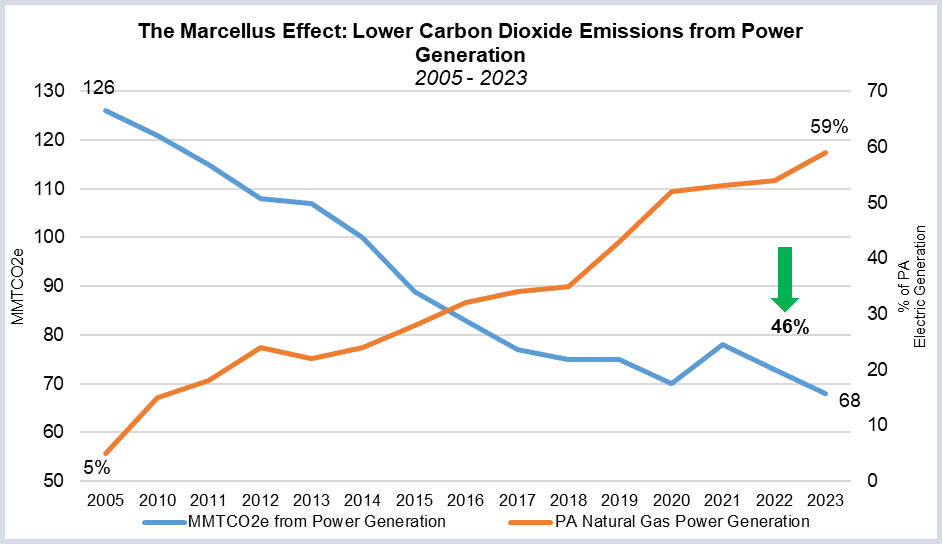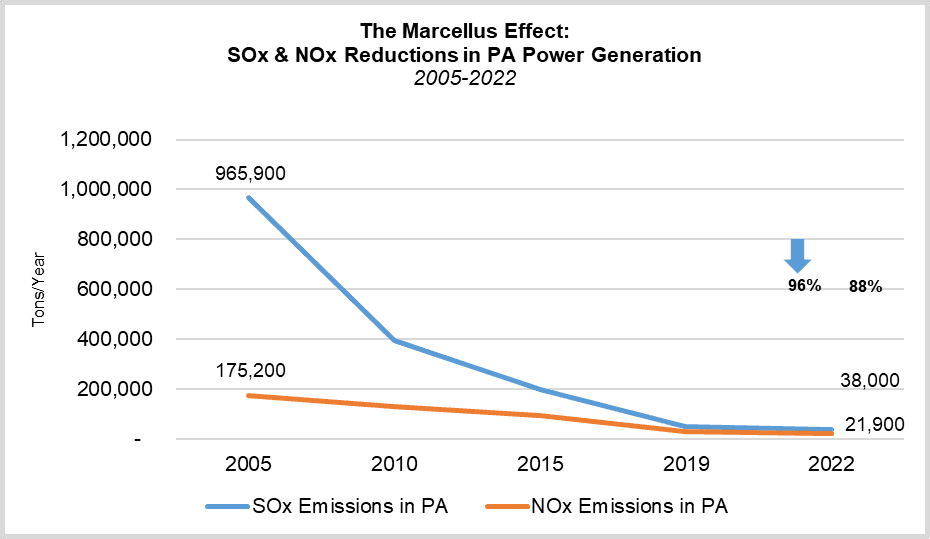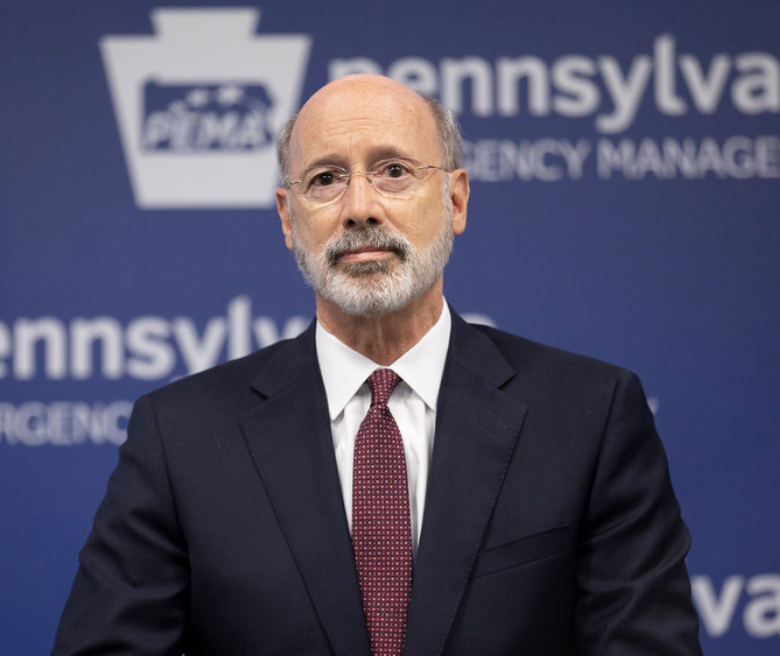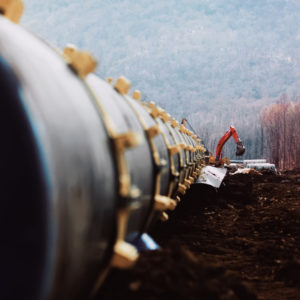Study: Pennsylvanians See +$450B in Health Benefits from Natural Gas

The switch from coal to natural gas for power generation has reduced emissions and air pollutants, which has resulted in $450 billion to $1.04 trillion in public health benefits for Pennsylvanians.
The Marcellus Shale Coalition’s results are from data from the state Department of Environmental Protection (DEP) and applied U.S. Environmental Protection Agency (EPA) standards. Marcellus Shale Coalition (MSC) spokeswoman said it then used EPA methods to assign a dollar value to each ton of nitrogen oxide (NOx) and sulfur oxides (SOx) reduced. Increased use of natural gas has improved air quality and helped alleviate respiratory ailments, meaning Pennsylvanians are saving healthcare costs, the group said.
The MSC’s findings come in the wake of new power plant emissions standards from the Biden administration that critics fear will jeopardize the reliability of the nation’s power grid and environmental gains by attacking natural gas generating capacity. As of 2032, baseload coal and new gas plants will be required to meet an emission standard equal to installing a carbon capture and sequestration system and running it at 90 percent efficiency.

As shale gas development became prevalent across the commonwealth and in-state natural gas electric generation increased from 5 percent to 59 percent between 2005-2022, emissions believed to contribute to respiratory ailments – NOx and SOx– are down by 81 percent and 93 percent respectively. The MSC said that yields between $7.9-$18.4 billion in NOx and $445.1 billion – $1.02 trillion in SOx cumulative public health benefits for the Keystone State.
“Pennsylvania’s energy leadership with the sustained development of clean natural gas is generating substantial benefits for our environment, economy and, as this data shows, the well-being of our communities,” said MSC President David Callahan. “Thanks to natural gas, Pennsylvanians breathe cleaner air than ever before, directly translating to improved quality of life for our residents.”
According to DEP data, between 2005 and 2022, the last year of available data, 11,127,515 fewer tons of SOx and 1,317,335 fewer tons of NOx were emitted from Pennsylvania’s electric power sector. These air pollutants are commonly associated with respiratory diseases such as asthma, pneumonia, bronchitis, and lung cancer.

“I’ve seen similar numbers of reduction throughout the entire PJM grid,” said state Sen. Gene Yaw (R-Bradford). PJM is the company that runs the regional power grid. “It reflects similar results since 2005. Carbon dioxide emissions are down by 43 percent, nitrogen oxide reduced 91 percent, and sulfur dioxide reduced 96 percent. hose numbers are pretty impressive.”
Pennsylvanians are gaining health benefits from “the conversion to natural gas,” said Yaw, who noted so-called renewables will not keep the grid running efficiently anytime soon.
“Our electricity comes from 60 percent natural gas, 32 percent nuclear, 5 percent coal, and all renewables account for less than 3 percent, and 3 percent includes hydro,” said Yaw. “Those numbers are reflective of the benefits of natural gas. Natural gas is a necessary part (of power generation) if we are going to have any reliability.
“Renewables alone will not power our electricity grid. Those numbers are reflective of the benefits of natural gas in Pennsylvania. What we should be doing is promoting the clean energy of natural gas, exploring natural gas for both industry and electricity generation.”
Sen. Tracy Pennycuick (R-Montgomery) said, “The MSC analysis confirms what we’ve known for years: that Pennsylvania’s abundant supply of natural gas is the cleanest, most affordable, reliable fossil fuel and is less carbon intensive than other sources of energy. Pennsylvania is positioned to be a leader in energy development, production, and distribution. We must unleash our abundant supply of natural gas to further drive our economy and ensure our energy security.”
David Marks, the principal of energy consulting firm PA Energy Fuels, said, “The Marcellus Shale Coalition analysis of the benefits of burning natural gas versus coal for power generation requires a lot of number crunching. But even without market details, we already know that natural gas burns much cleaner than coal or oil.
“And monetizing carbon emissions can be difficult, as the process is tied to moving targets: the fluctuating market value of carbon credits and the long-term effects on the health of people living in a variety of urban, suburban, and rural areas. This monetization process can also include physical carbon reduction activity including installing expensive infrastructure, identifying and realizing any tangible value including carbon capture and resale, and providing the leadership to manage this efficiently and constructively.
“Natural gas is a fossil fuel,” Marks continued, “though the global warming emissions from its combustion are much lower than those from coal or oil. Natural gas emits more than 50 percent, and up to 60 percent less carbon dioxide (CO2) when burned in new, efficient natural gas-power plants compared with emissions from a typical new coal plant. This makes natural gas a relatively clean-burning fossil fuel.
“Burning natural gas for energy results in fewer emissions of nearly all types of air pollutants and carbon dioxide emissions than burning coal or petroleum products to produce an equal amount of energy. This makes natural gas, which primarily consists of methane, the cleanest burning fossil fuel. When methane is produced from non-fossil sources such as food and green waste (renewable natural gas), it can literally take carbon out of the air.
“The United States cut its coal power use in half between 2014 and 2022, replacing it with a combination of gas, solar and wind. The decline was largely due to utilities and grid operators relying more on these more efficient natural gas power plants,” said Marks. Not only are gas-fired power plants less expensive to build and operate than coal plants, but the fuel has consistently remained low in price since the Marcellus Phenomenon. Marcellus production has flooded the market with natural gas, forcing the price down for more than a decade. he growth of renewable energy has also contributed to coal’s retreat, but not nearly as much as the growth of gas.”
“Natural gas costs less, burns cleaner, is less expensive for power generation, and has always been a healthier alternative to burning coal or oil,” he added.
In Pennsylvania, America’s second-largest natural gas producing state, gas use in the electric power sector led to the largest year-over-year carbon emissions decline on record. Overall, carbon emissions from the state’s power sector are down 46 percent compared to peak 2005 levels. That is equivalent to removing 12.5 million cars from the road for a year – or removing every car in Pennsylvania, New Jersey and several neighboring states combined, the MSC said.
“The undeniable consumer, environmental and energy security gains afforded by Pennsylvania’s natural gas abundance should serve as a wakeup call for those convinced natural gas should not have a role in our future energy mix,” Callahan concluded.
Please follow DVJournal on social media: Twitter@DVJournal or Facebook.com/DelawareValleyJournal










